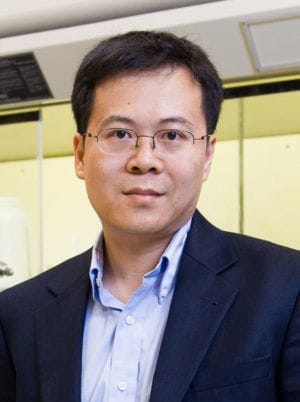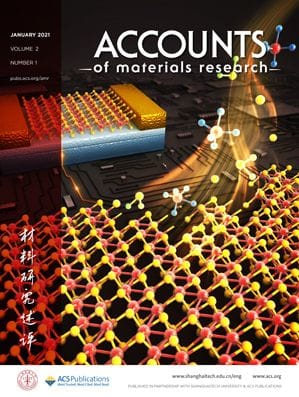Professor Jiaxing Huang of Northwestern University is the inaugural Editor-in-Chief of Accounts of Materials Research, a new journal launched in partnership between ACS Publications and ShanghaiTech University. The new journal will publish short reviews on basic research and applications in all areas of materials science and engineering. Read this interview to learn more about his […]


Professor Jiaxing Huang of Northwestern University is the inaugural Editor-in-Chief of Accounts of Materials Research, a new journal launched in partnership between ACS Publications and ShanghaiTech University. The new journal will publish short reviews on basic research and applications in all areas of materials science and engineering.
Read this interview to learn more about his work and his vision for the new journal.
Can you tell us a bit about your career to date?
I wandered into scientific research during my undergraduate years at University of Science and Technology of China (USTC), which turned out to an exciting and transformative experience that motivated me to pursue graduate study. I moved to University of California, Los Angeles (UCLA) in 2000, and eventually obtained my Ph.D. in Chemistry, working on conducting polymers. I was very lucky to receive a 3-year Miller Research Fellowship, which I took full advantage of to carry out postdoc work at University of California, Berkeley from 2004-2007, before joining Northwestern University as an assistant professor of materials science and engineering. I have enjoyed learning the diverse aspects of materials research for the past 13 years.
What are you currently working on? And what challenges are you hoping to solve?
Overall, the core expertise of my group is materials processing, which by the way, is a lot more diverse and cooler than it may sound. We create new materials and make them as readily usable as possible to enable additional discoveries and accelerate applications. Some current examples include bulk nanostructured materials based on two-dimensional building blocks and additive-free, high-concentration solution processing of nanomaterials, and materials for personal care, corrosion control, and tribology. These lead to some interesting forms of materials such as gels, doughs, and disordered dense solids made of these nanomaterials.
At the early stage of the COVID-19 outbreak, encouraged by my fearless group members, we also transformed ourselves to study how we as non-biological researchers may contribute to control the spread of infectious respiratory diseases. We are pursuing some ideas with the goal of developing material-based tools for making sources less infectious and breaking the transmission pathways.
Congratulations on your appointment as Editor-in-Chief of Accounts of Materials Research. Can you tell us about your vision for the journal, and how you hope the community will benefit from research published here?
I see Accounts of Materials Research as a home journal for all materials researchers. We welcome Accounts articles from all areas of materials, not at all limited to chemistry-based topics. It’s quite common for researchers to come up with new ideas, new angles, and new insights when we summarize a branch of our own work every once a while. An Account article is the perfect way to record these thoughts and it can teach readers something unique and personal. I hope people enjoy reading these rather concise Account articles, even for topics they are not familiar with, because this is a quick way to learn about a new subject and get to “know” those researchers, in a socially and temporally distanced way!
How can contributions to Accounts of Materials Research help tackle real-world challenges?
Account articles share authors’ insights and foresight with other researchers, which is already a way to accelerate their societal impacts. Meanwhile, we will also invite articles to present and define materials research needs in real-world challenges such as in clean water, sustainable energy, and public health crises. If we help to connect problems with expertise, I am optimistic that something new and exciting will happen.
Have there been any career highlights in your career to date that you are especially proud of?
Publishing my first 1st author ACS paper in JACS in 2003, and a call-for-action Perspective article proposing research needs and ideas to address COVID-19 in ACS Nano this year. And the many little moments of seeing my group members grow and thrive.
What is the best advice you have received?
My graduate adviser once said that a professor helps students find out what they are good at and works to bring the best out of them, with which I have learned to agree. In my own job, I do view frontier research as a great vehicle for education, broadly defined. I think it is a pretty good philosophy for being an editor, too.
